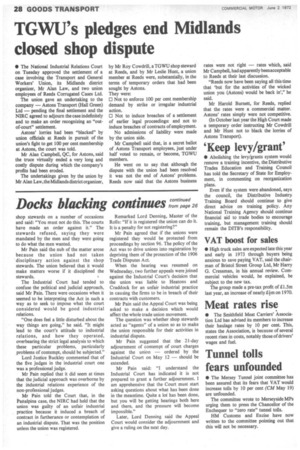TGWU's pledges end Midlands closed shop dispute
Page 30

If you've noticed an error in this article please click here to report it so we can fix it.
• The National Industrial Relations Court on Tuesday approved the settlement of a case involving the Transport and General Workers' Union, its Midlands district organizer, Mr Alan Law, and two union employees of Reeds Corrugated Cases Ltd.
The union gave an undertaking to the company — Astons Transport (Hall Green) Ltd — pending the final settlement and the NIRC agreed to adjourn the case indefinitely and to make an order recognizing an "outof-court" settlement.
Astons' lorries had been "blacked" by union officials at Reeds in pursuit of the union's fight to get 100 per cent membership at Astons, the court was told.
Mr Alan Campbell, QC, for Astons, said the truce virtually ended a very long and costly dispute during which the company's profits had been eroded.
The undertakings given by the union by Mr Alan Law, the Midlands district organizer, by Mr Roy Cowdrill, a TGWU shop steward at Reeds, and by Mr Leslie Hunt, a union member at Reeds were, substantially, in the terms of temporary orders that had been sought by Astons.
They were: El Not to enforce 100 per cent membership demand by strike or irregular industrial action.
Not to induce breaches of a settlement of earlier legal proceedings: and not to induce breaches of contracts of employment.
No admissions of liability were made by the union side.
Mr Campbell said that, in a secret ballot of Astons Transport employees, just under half voted to remain, or become, TGWU members.
He went on to say that although the dispute with the union had been resolved it was not the end of Astons' problems. Reeds now said that the Astons business rates were not right — rates which, said Mr Campbell, had apparently beenacceptable to Reeds at their last discussion.
"Reeds now have been saying all this time that 'but for the activities of the wicked union you (Astons) would be back in'," he said.
Mr Harold Burnett, for Reeds, replied that the rates were a commercial matter. Astons' rates simply were not competitive.
(In October last year the High Court made a temporary order instructing Mr Cowdrill and Mr Hunt not to black the lorries of Astons Transport).
















































































































































